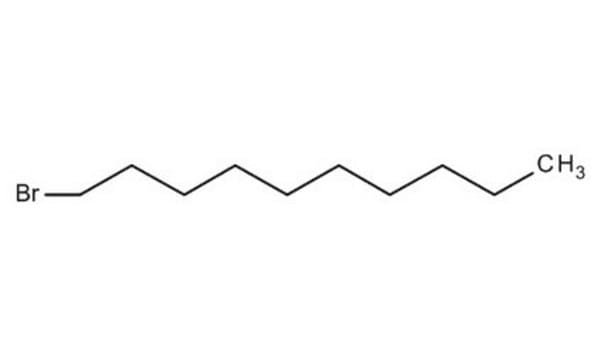144991
1,7-Dibromoheptane
97%
Synonym(s):
Heptamethylene dibromide
Sign Into View Organizational & Contract Pricing
All Photos(1)
About This Item
Linear Formula:
Br(CH2)7Br
CAS Number:
Molecular Weight:
257.99
Beilstein:
1734575
EC Number:
MDL number:
UNSPSC Code:
12352100
PubChem Substance ID:
NACRES:
NA.22
Recommended Products
Quality Level
Assay
97%
form
liquid
refractive index
n20/D 1.503 (lit.)
bp
255 °C (lit.)
density
1.51 g/mL at 25 °C (lit.)
functional group
bromo
SMILES string
BrCCCCCCCBr
InChI
1S/C7H14Br2/c8-6-4-2-1-3-5-7-9/h1-7H2
InChI key
LVWSZGCVEZRFBT-UHFFFAOYSA-N
Looking for similar products? Visit Product Comparison Guide
Application
1,7-Dibromoheptane was used in the synthesis of random thermotropic liquid crystalline copolyether and ternary copolyether. It was also used in the synthesis of thermotropic liquid crystalline dendrimer exhibiting a nematic phase.
Signal Word
Danger
Hazard Statements
Precautionary Statements
Hazard Classifications
Acute Tox. 2 Oral
Storage Class Code
6.1A - Combustible acute toxic Cat. 1 and 2 / very toxic hazardous materials
WGK
WGK 3
Flash Point(F)
235.4 °F - closed cup
Flash Point(C)
113 °C - closed cup
Personal Protective Equipment
dust mask type N95 (US), Eyeshields, Gloves
Choose from one of the most recent versions:
Already Own This Product?
Find documentation for the products that you have recently purchased in the Document Library.
Customers Also Viewed
Synthesis and characterization of a thermotropic nematic liquid crystalline dendrimeric polymer.
Percec V and Kawasumi M.
Macromolecules, 25(15), 3843-3850 (1992)
Liquid crystalline polyethers based on conformational isomerism. 6. Influence of copolymer composition of a ternary copolyether based on 1-(4-hydroxyphenyl)-2-(2-methyl-4-hydroxyphenyl) ethane, 1, 5-dibromopentane, 1, 7-dibromoheptane, and 1, 9-dibromononane on its mesomorphic phase transitions.
Percec V and Tsuda Y.
Macromolecules, 23(1), 5-12 (1990)
Functional polymers and sequential copolymers by phase transfer catalysis. 24. The influence of molecular weight on the thermotropic properties of a random copolyether based on 1, 5-dibromopentane, 1, 7-dibromoheptane, and 4, 4'-dihydroxy-a-methylstilbene.
Percec V, et al.
Journal of Polymer Science Part A: Polymer Chemistry, 25(7), 1943-1965 (1987)
Yuan-Ping Pang et al.
PloS one, 4(2), e4349-e4349 (2009-02-06)
Aphids, among the most destructive insects to world agriculture, are mainly controlled by organophosphate insecticides that disable the catalytic serine residue of acetylcholinesterase (AChE). Because these agents also affect vertebrate AChEs, they are toxic to non-target species including humans and
Our team of scientists has experience in all areas of research including Life Science, Material Science, Chemical Synthesis, Chromatography, Analytical and many others.
Contact Technical Service














